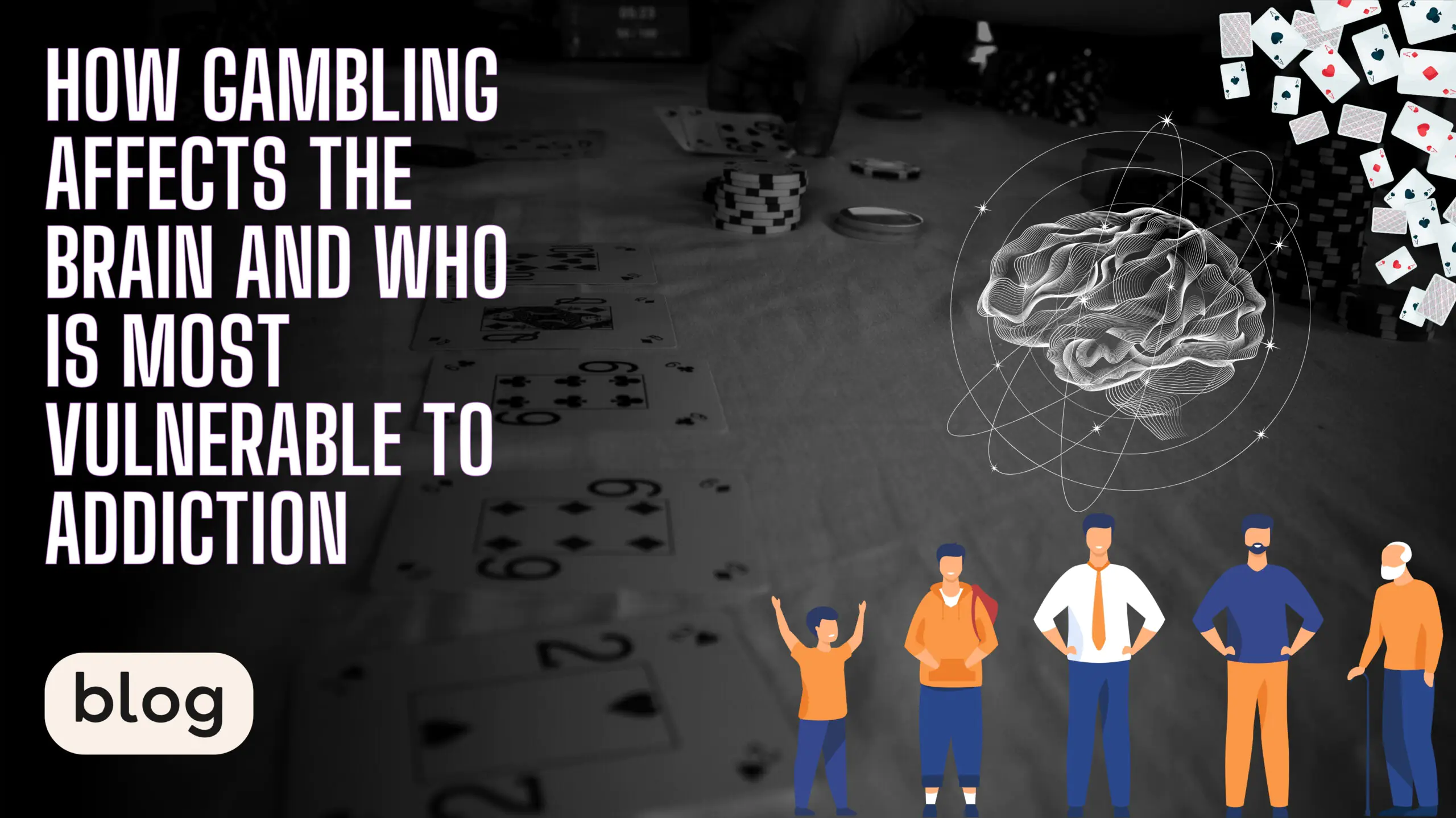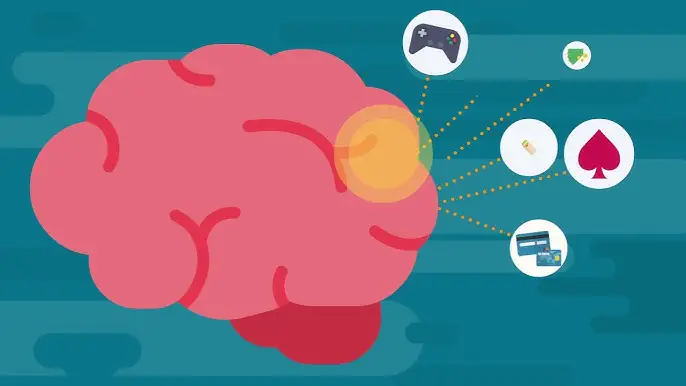
How Gambling Affects the Brain and Who is Most Vulnerable to Addiction?
The roulette wheel spun, a blur of red and black. John held his breath. His pulse pounding in his ears. This wasn’t just about the money anymore. It was about the feeling. The rush of adrenaline and the hope of a life-changing win. But as the wheel slowed, a different kind of feeling crept in. The cold dread of loss. John’s story, like millions of others, shows the powerful hold gambling can have on the human brain!
Gambling is a phenomenon which has had a continuous historical trend, from ancient times until today. People who usually take part in gambling activities are individuals who, apart from financial enrichment, tend to find other forms of enrichment, such as emotional and spiritual enrichment, which is related to adrenaline and brain activity. It is the moment when the brain, as a very important organ in our body, can be affected and influenced by gambling.
This is the reason why in this article, we will see what impact gambling has on the brain and neurologically, how gambling addiction affects different brain processes, who are the most vulnerable people to gambling addiction, and what are the best strategies for stopping it of gambling addiction and reducing its influence.
The Neurological Impact of Gambling

First of all, did you know that gambling disorder affects 0.4-1.6% of adults worldwide and is associated with dysfunction across multiple cognitive domains, particularly impulsivity and compulsivity? Well yes, and at the same time, neuroimaging studies have revealed structural and functional abnormalities in networks involved in reward processing and top-down control. What parts do these networks affect?
They affect the brain with what is called cortical thinning in the prefrontal cortex and hyperactivation in the medial prefrontal cortex and ventral striatum. And as you may guess, multiple neurotransmitter systems, including the famous dopamine, serotonin, and glutamate, are implicated in the pathophysiology of gambling disorder. What is really interesting is that the condition shows 50-60% heritability and is associated with elevated rates of certain personality traits and disorders.
Thus, gambling behavior provides a paradigm for investigating human choice behavior and irrationality, while pathological gambling offers insights into addictive mechanisms without exogenous drug effects. Meanwhile, even more research on the neurobiology of gambling reveals other complex interactions between brain systems and neurotransmitters that contribute to the thrill and potential addiction associated with gambling. So, what are these insights?
Dopamine release in the ventral striatum has been linked to increased excitement levels in pathological gamblers, despite poorer decision-making performance. The maintenance of pathological gambling is attributed to an imbalance between hyperactive impulsive, hypoactive reflective, and interoceptive neural systems.
So, you wonder why there are persisting and repetitive gambling behaviors? That is because structural factors in gambling games may promote repetitive gambling experiences, leading to loss of control in some individuals.
So basically, imagine your brain playing tug-of-war. One side is screaming “Go for it! Hit that spin button!”. This side is fueled by dopamine rushes and the thrill of a potential win. The other side is trying to pump the brakes. However, it’s outgunned and worn down. That’s what’s happening inside the brain of someone struggling with gambling disorder. A constant battle for control!
Gambling Addiction and the Brain
Pathological gambling (PG) shares numerous similarities with substance use disorders (SUDs). Both PG and SUDs have comparable neurocognitive deficits, particularly in impulsivity and compulsivity. They involve similar brain regions such as the ventromedial prefrontal cortex and striatum. Neurochemically, dopamine plays a crucial role in both disorders, influencing reward processing and risk-taking behavior.
Neuroimaging studies have revealed analogous neural correlates of craving states in PG and cocaine dependence. The similarities extend to clinical symptoms, including loss of control, craving/withdrawal, and neglect of other life areas.
At the same time, there are significant impairments in decision-making, impulse control, and risk assessment. PGs has deficits in risky decision-making and cognitive impulsivity, similar to those observed in alcohol-dependent individuals. These impairments are characterized by myopia for the future and are associated with explicit knowledge, executive functions, and impulsivity traits. At the same time, decision-making deficits in PGs are related to more severe delay discounting and increased urgency and less premeditation.
So it’s like this: if our brains are wired for rewards, then gambling can hijack that system. It hits those same pleasure centers, making it crazy hard to resist. And this happens even when you know it’s bad for you. The good news is that understanding these shared brain changes helps us develop better ways to treat both types of addiction.
Demographics Most Vulnerable to Gambling Addiction
Who is Most at Risk?
Certain demographic groups are more vulnerable to gambling addiction:
- Young Adult Males: Particularly single, educated, and employed or studying full-time.
- Racial Minorities: Higher prevalence rates in Black and Native/Asian Americans.
- Other Vulnerable Groups: Adolescents, the elderly, and those with comorbid psychiatric or substance use disorders.
Behavioral Factors
Factors increasing the risk of gambling problems include:
- Frequent betting and higher expenditure
- Impulsive responses to betting opportunities
- Influences from media and social circles
Prevention and intervention strategies
Let’s talk about how to keep those brains healthy and dodge the gambling danger zone:
First up: Prevention is Key!
- Knowledge is power: Just like understanding the risks of smoking or too much junk food, knowing how gambling can rewire your brain is huge. Schools, parents, everyone should be talking about this stuff.
- Setting limits early: Treat gambling like a spicy treat, not a main course. Set budgets before you play, and stick to them! Lost track of time? That’s your cue to walk away.
- Fun over fortune: Remember, gambling should be about entertainment, not chasing riches. It’s time to find something else that floats your boat, if it’s not fun anymore,
Need a Hand? You’re Not Alone!
- Early help is best help, so if you or someone you know is struggling, don’t wait! Therapists, support groups, and helplines are here to help you regain control. Why? Because therapy can rewire your brain (For Real!). Cognitive Behavioral Therapy (CBT) is like a brain workout, helping you identify those gambling triggers and develop healthier coping mechanisms.
- Keep in mind also that support systems are golden. Family, friends, support groups and having people in your corner makes a world of difference!
3Bs: Brains, Bets, and-Breaking Free
We’ve covered a lot of ground here, but the main takeaway? Gambling isn’t just a bit of fun! It has a real impact on our brains, especially for those who are vulnerable. Understanding how those dopamine hits and reward circuits work is key to preventing addiction in the first place.
So, try to remember that early intervention is crucial. If you or someone you know is struggling, don’t hesitate to reach out for help. With the right support and strategies, it is possible to rewire those habits and regain control. Because nobody deserves to be lost in the spin cycle of addiction.
Resources to keep you informed:
National Council on Problem Gambling: https://www.ncpgambling.org/ Think of them as your gambling-info gurus.
MentalHealth.gov: https://www.samhsa.gov/ Your one-stop shop for all things mental health, including gambling disorder.
Remember, seeking help is a sign of strength. It is not weakness. You got this!
Sources used for this article:






